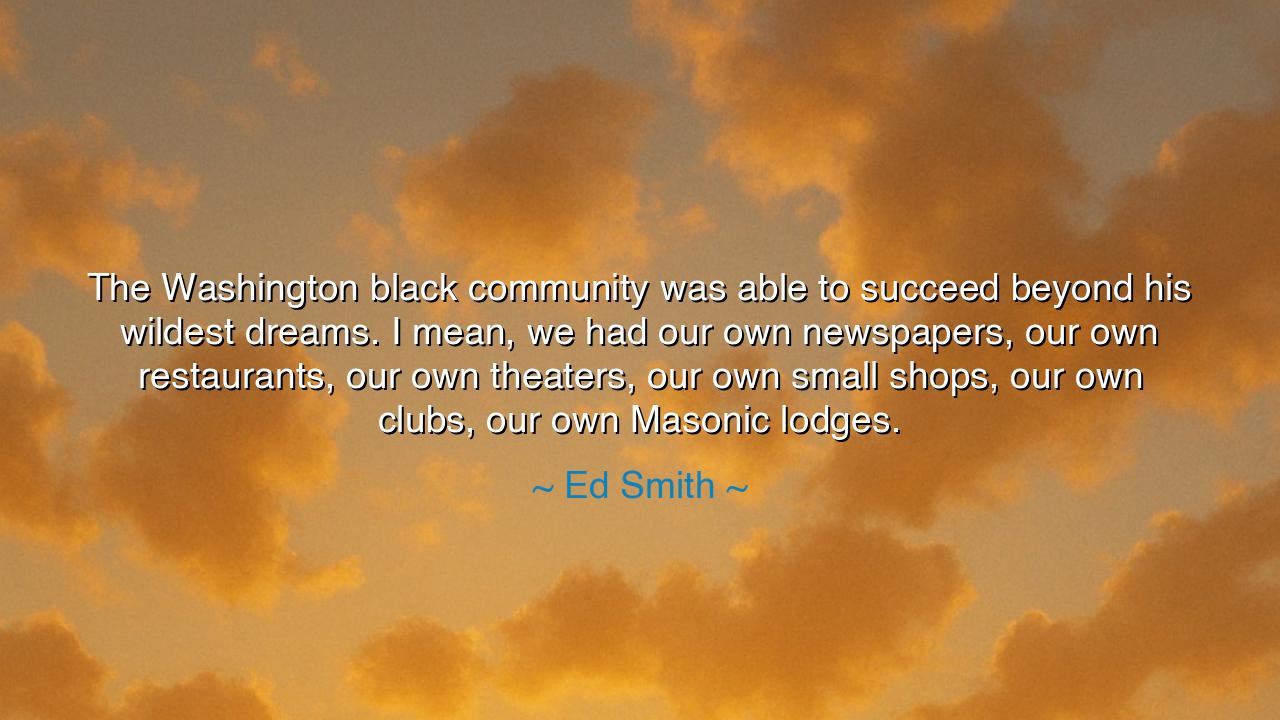
The Washington black community was able to succeed beyond his
The Washington black community was able to succeed beyond his wildest dreams. I mean, we had our own newspapers, our own restaurants, our own theaters, our own small shops, our own clubs, our own Masonic lodges.






When Ed Smith declared, “The Washington black community was able to succeed beyond his wildest dreams. I mean, we had our own newspapers, our own restaurants, our own theaters, our own small shops, our own clubs, our own Masonic lodges,” he was not merely recounting a memory — he was giving testimony to a triumph of spirit. His words echo with the dignity of a people who, in the face of oppression, built worlds of their own. It is a statement of pride, of perseverance, and of proof — that when denied access to the tables of power, the Black community of Washington, D.C. carved out its own kingdom of enterprise, culture, and unity.
The origin of this quote lies in Ed Smith’s reflections on a remarkable era in African American history — the first half of the 20th century, when segregation sought to divide, yet solidarity forged greatness. Washington, D.C., though shadowed by the laws of Jim Crow, became a beacon of Black excellence. In neighborhoods such as U Street — once known as “Black Broadway” — the hum of jazz clubs, the rhythm of printing presses, and the conversations in restaurants and parlors told a story of a people who refused invisibility. It was a time when self-determination was not merely a philosophy, but a way of survival. In building their own institutions, Black Washingtonians built something even greater: community sovereignty.
In the style of the ancients, we might say this was a people who, cast into exile within their own land, built a new Athens of the soul. Segregation, meant to imprison, became the forge of independence. What was intended to humiliate became a challenge to create. When doors closed, hearts opened. When systems failed them, they built systems of their own. The Black newspaper became their oracle, the church their temple, the Masonic lodge their school of brotherhood and wisdom. Their theaters rang with voices that told the truth of their lives — voices the wider nation tried not to hear. And in this quiet revolution of dignity, they created something the oppressor could neither understand nor destroy.
Consider the story of Carter G. Woodson, the “Father of Black History,” who made Washington his home. He founded the Association for the Study of Negro Life and History and established The Journal of Negro History, planting seeds that would grow into Black History Month. In a time when the nation’s textbooks erased the contributions of his people, Woodson declared that no race can be free until it writes its own history. His life and work embodied the very world Ed Smith described — one of intellectual independence and cultural renaissance. In those same years, Howard University, the “capstone of Negro education,” trained generations of lawyers, artists, and scholars who would lead the battles for civil rights and justice.
What Ed Smith saw — and what he celebrated — was not merely economic achievement, but the flowering of self-reliance and faith. When he spoke of “our own,” he was bearing witness to a truth often forgotten in the modern world: that power is not only found in institutions but in identity and unity. His words remind us that greatness is not granted by permission — it is built, cultivated, and defended by those who refuse to surrender their worth. The success of the Black community in Washington, D.C. was not accidental; it was the harvest of generations who tilled the fields of education, labor, and mutual support.
Yet within his pride, there is also an undercurrent of longing — the sense that something precious has been lost in the march of modernity. As integration came, many of these self-sustaining Black institutions began to fade. The walls that once separated also, paradoxically, protected; when they fell, so too did many of the local businesses and community centers that had defined an era. Ed Smith’s words therefore carry both celebration and warning: a reminder that progress, without preservation of identity, can lead to forgetting the foundations that made progress possible.
So, my child, hear the wisdom in his words: build your own. Not in separation, but in pride. Create communities that sustain your spirit as well as your ambition. Support the institutions that uplift your people. Honor those who came before, for their struggles were the soil from which your freedom grows. Let no generation forget that the power to thrive lies within them — not in the approval of others, but in the unity, creativity, and courage that once made the Washington Black community “succeed beyond wildest dreams.”
For this is the eternal lesson of history: that those who build with heart and purpose can transform even injustice into empire, even exclusion into excellence, and even sorrow into song.






AAdministratorAdministrator
Welcome, honored guests. Please leave a comment, we will respond soon